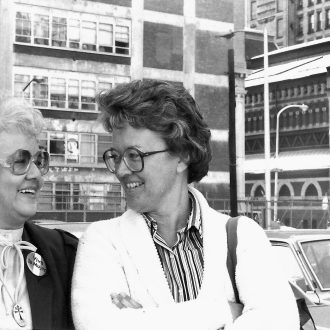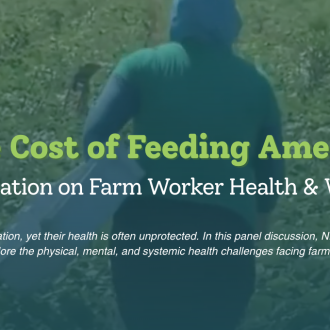by Blake Daniel, Duke Divinity Intern
 On Wednesday the National Farm Worker Ministry North Carolina staff attended the Racial Justice Institute Training in Greensboro, NC. The training took place at the International Civil Rights Center & Museum, a stunning location that pays tribute to past and current struggles for civil rights. It was led by Rinku Sen, a leading figure in the racial justice movement.
On Wednesday the National Farm Worker Ministry North Carolina staff attended the Racial Justice Institute Training in Greensboro, NC. The training took place at the International Civil Rights Center & Museum, a stunning location that pays tribute to past and current struggles for civil rights. It was led by Rinku Sen, a leading figure in the racial justice movement.
Rinku defined racial justice as “the creation and proactive reinforcement of policies, practices, attitudes and actions that produce equitable power, access, opportunities, treatment, and outcomes for all.” The goal or indicator of racial justice is “equitable impacts and outcomes across race.” We as participants were challenged to think about the different levels of racism (internalized, interpersonal, institutional, and structural) and to brainstorm about how justice can permeate and affect each level.
The training was very helpful, if a bit overwhelming for Lauren and myself, who are new NFWM interns wrestling with the big issues (like race) involved in justice for farmworkers. But it was important to enter into dialogue with other non-profit, academic, and private sector leaders about how we can all do a better job of recognizing racism and affecting change. We were especially challenged to think about how racism factors into immigration policy and public views of migrant workers.
What is race? How do we, as human beings, think about race? Is race only related to the color of a person’s skin, or is it something much deeper? I think we all agree it is, but we may disagree on how, exactly, it’s much deeper. We may agree that race should be thought of in cultural or political terms, but what about others? Can we think about race theologically? Anthropologically? Sexually? What about those of us who are white, who have never had to intentionally think about race or feel ostracized by a dominant racial group?
Indeed, it’s a deep issue, one that needs to be addressed in a bold and reconciliatory way. As Rinku said yesterday, “It’s important to be explicit about race but not exclusive. Race is a part of most things but not all of anything.”
May we all be conscious of race not as an abstract concept but as a reality of living in a broken world, and may we all continue to pursue justice with humility and grace.



